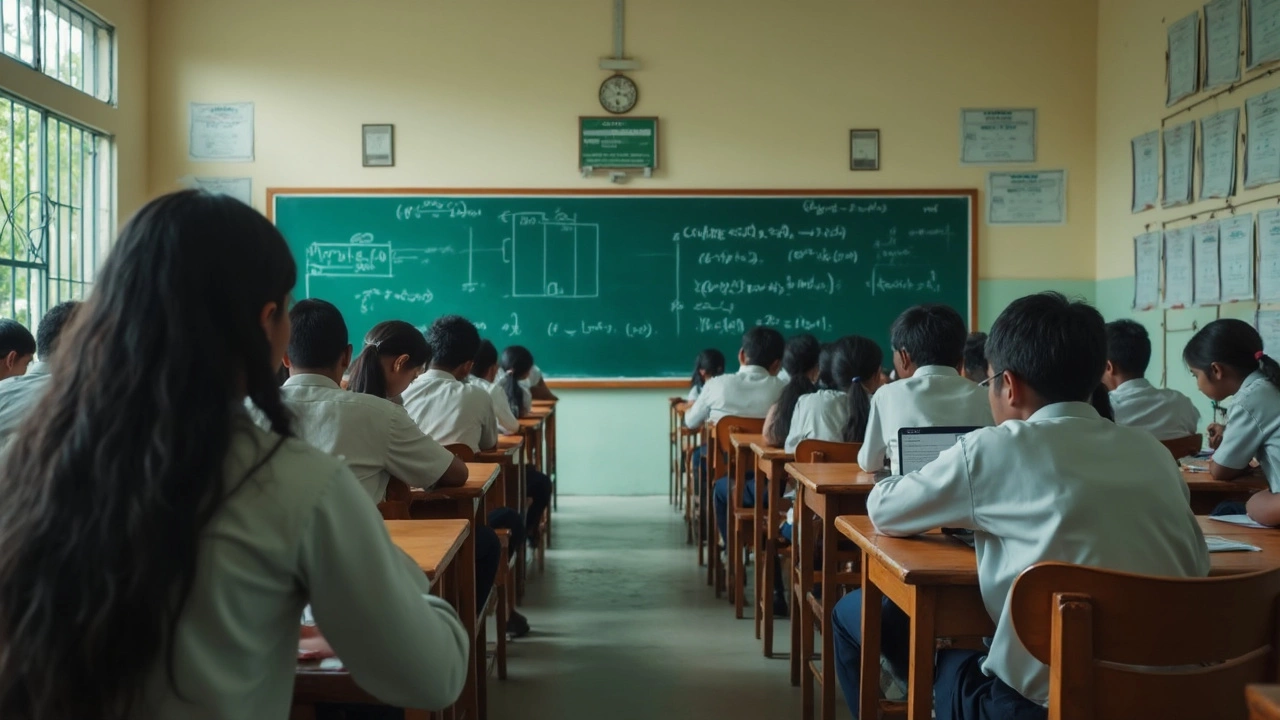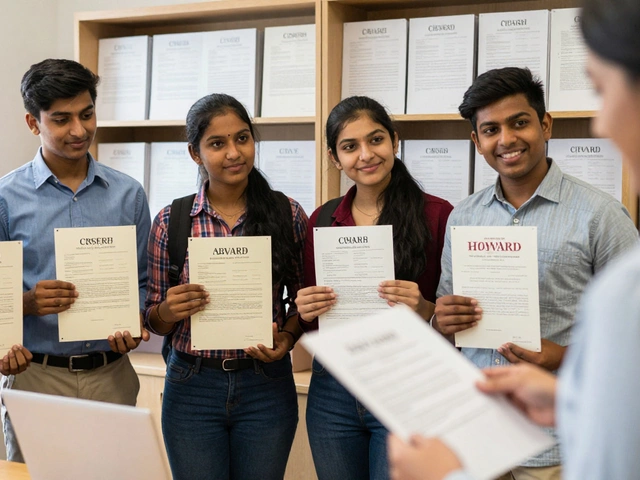If you ask any student in India about their school board, chances are, you’ll hear a lot about CBSE. Some call it the final boss of Indian education. But is CBSE really the hardest board in the world, or is it just hype?
First off, people sweat over CBSE for a reason. The curriculum is massive, the exams don’t hold your hand, and the marking isn’t always generous. And unlike some boards that let you pick easy subjects, CBSE often pushes you into mainstream subjects like maths and science, whether you love them or not.
But here’s the thing: just being tough doesn’t mean it’s unbeatable. Lots of students crack CBSE every year. The trick is about understanding how it works, what it wants from you, and how to play the system to your advantage.
- Why People Say CBSE Is the Hardest
- How CBSE Compares Globally
- CBSE Survival Hacks: Real Talk
- Hidden Benefits (Yep, They Exist)
Why People Say CBSE Is the Hardest
The Central Board of Secondary Education, or CBSE, has a reputation for being a real challenge in India—and for good reason. The main thing that hits students first is the size and depth of the syllabus. Every subject, from maths to biology, expects you to go deep into the basics and then apply them in ways that aren’t always obvious from textbooks.
CBSE exams aren’t just about memorizing. Questions often ask you to think critically, and “rote learning” can only get you so far. Take maths, for example—there are loads of tricky application-based problems, and it’s normal for even top performers to get surprised during exams. The marking scheme is also strict; examiners have clear instructions to deduct marks if answers aren’t exactly what’s expected. No room for creative interpretations here.
Here’s something that stands out: CBSE has a standard curriculum across the whole country, so whether you’re in a big metro or a small town, you’re up against thousands of other students facing exactly the same questions. There’s no dodging tough chapters, and no big regional leniency.
| Exam Fact | CBSE Data |
|---|---|
| Number of Students (2024 class 10th) | ~22 Lakhs |
| Pass Percentage (2024 class 12th) | 87.98% |
| Typical Syllabus Volume (per subject) | ~30 chapters |
| Assessment Style | Application & Analysis |
Then there’s the pressure. Since a lot of national-level entrance exams (like JEE and NEET) are based on the CBSE syllabus, students who want to score well don’t just need to pass—they need to master the entire stack. Parents, tuition centers, everyone is watching. You’ll often hear, “If you can do CBSE, you can handle anything.”
Bottom line: the workload, standardized testing, and the intense focus on understanding (not just mugging up) make CBSE feel like a mountain. But every year, lakhs of students climb it—and that’s proof it’s rough, but not impossible.
How CBSE Compares Globally
When you stack CBSE against other big name boards like ICSE, IB (International Baccalaureate), and Cambridge (IGCSE), things get interesting. Each one is tough in its own way, but they all do things a bit differently.
The CBSE board is mostly about streamlined learning and national-level standards. It’s huge in India, with over 24,000 schools under it globally as of 2024. The main goal is to keep content uniform and focus hard on science, maths, and languages—subjects that pop up in most Indian entrance exams. For students aiming for engineering or medicine in India, CBSE often feels like boot camp.
Compare that with IB, which is all about projects and critical thinking. IB students have to write essays, do real-life projects, and face more internal assessment than timed, high-pressure exams. Cambridge IGCSE allows for a wide range of subjects and flexibility, so those who want art or economics can take that route. ICSE, another Indian board, is famous for its pile of subjects and focus on English, but its student count is much lower.
Now, check out this quick look at how they line up:
| Board | Main Focus | Assessment Style | # of Subjects | Regions |
|---|---|---|---|---|
| CBSE | Maths, Science, Languages | Mostly final exams | 5-6 core, few electives | India, Middle East, Asia |
| IB | Critical Thinking, Research | Projects + Exams | 6 (flexible) | Global |
| Cambridge (IGCSE) | Wide Subject Choice | Coursework + Exams | 70+ options | Global |
| ICSE | English, Arts, Science | Detailed papers | 8-10 | Mostly India |
One thing to remember: CBSE’s huge reach means it sticks to what works for the average Indian student. It’s predictable in format—good for those who like routine and bad for those who want more choice in subjects or different types of assessment. Meanwhile, IB and Cambridge suit students who want to focus on analysis or creative subjects early on.
So, is CBSE the hardest? If you care about competitive exams in India, CBSE definitely wins points. But globally, the “hardest” board depends on the student—what challenges you more: a mountain of facts, or a mountain of creative projects?

CBSE Survival Hacks: Real Talk
Let’s be honest, just knowing you’re taking on the CBSE board is enough to make anyone break out in a sweat. The syllabus? Yeah, it’s heavy. The exams? It’s not about rote-learning, you’ll actually have to understand what’s in your books. But here’s what usually works for students who not only survive but end up smashing board exams.
First: Make your NCERT textbooks your best friend. Literally, 90% of the exam paper comes straight from them or stays super close to what’s written inside. Don’t waste time trying to collect every guidebook on the market. Focus on finishing, re-reading, and nailing the NCERTs. If you need extra practice, use sample papers published by the CBSE itself, not some random publisher.
Second: Follow a routine that you can actually stick with. No, you don’t need a 16-hour grind. What works better is consistent effort—three to four hours daily, but focused. Try to mix subjects every day. Doing maths after English can actually refresh your brain.
Pro tip: The CBSE likes asking application-based and HOTS (Higher Order Thinking Skills) questions. This means you can’t just memorize definitions. Write your own answers after reading concepts, and practice sample questions that twist the concept a bit. It primes you for whatever oddball question they might throw at you.
Now, let’s get real with the numbers. Here’s a quick table—recent pass rates and average scorerates (all-India figures from 2024):
| Year | Pass Rate (%) | Average Score (%) |
|---|---|---|
| 2022 | 92.7 | 64.9 |
| 2023 | 87.3 | 62.1 |
| 2024 | 89.4 | 63.5 |
This doesn’t mean it’s easy, but if nearly 90% can pass, you definitely can with the right hacks.
- Don’t skip last year’s question papers—patterns repeat a lot. Sometimes even questions get recycled.
- For science or maths, practicing diagrams and stepwise solutions scores more marks than long stories.
- For English or languages, writing clear, simple sentences works better than fancy vocab.
- Don't ignore the sample answer sheets uploaded by toppers—check them out on the official CBSE site. See how they format answers and copy that style.
And don’t underestimate the power of sleep. Pulling all-nighters isn’t a flex; waking up fresh helps way more than being a zombie with a textbook.
Hidden Benefits (Yep, They Exist)
Okay, nobody signs up for pain on purpose, but let’s be real: going through the CBSE grind has some sneaky perks that stick with you for life. For starters, CBSE's focus on conceptual understanding isn't just a buzzword. The board is obsessed with NCERT textbooks, which means the stuff you study here actually comes back when you’re tackling entrance exams like JEE or NEET. That’s why coaching centers in India all use NCERT as their bible.
The structure of CBSE keeps you on your toes. Unlike some boards focused more on rote memory, the exam papers love throwing questions that make you think and apply what you’ve learned. This approach trains you to analyze, not just memorize. If you ever decide to compete globally—say, trying for SATs or going abroad—the skills you pick up here are worlds apart from boards that spoon-feed answers.
Universities, both in India and outside, know that someone from the CBSE camp will usually have their basics down solid. Fun fact: Over 70% of applicants to top Indian engineering and medical colleges every year are from the CBSE board, according to 2023 data. Here’s a quick snapshot that proves CBSE does more than kill your sleep schedule:
| Benefit | How it Helps |
|---|---|
| NCERT Core Syllabus | Makes national entrance exams easier |
| English Medium | Smoother for global studies and migration |
| Continuous Evaluation | Keeps you less stressed than boards with one final exam |
| Uniform Standards | Works the same whether you’re in Delhi or Dubai |
A lot of students also say that having a structured syllabus and regular internal tests actually makes time management easier — weird but true. And if you ever switch schools because your parents move for work, CBSE makes that jump way less of a headache since the board’s syllabus is almost identical across the country and even in Indian schools abroad.
So yeah, the CBSE journey is rough, but the skills you pick up seriously pay off—sometimes where you least expect it. Those late-night cramming sessions and endless sample papers prepare you for much more than board exams.




